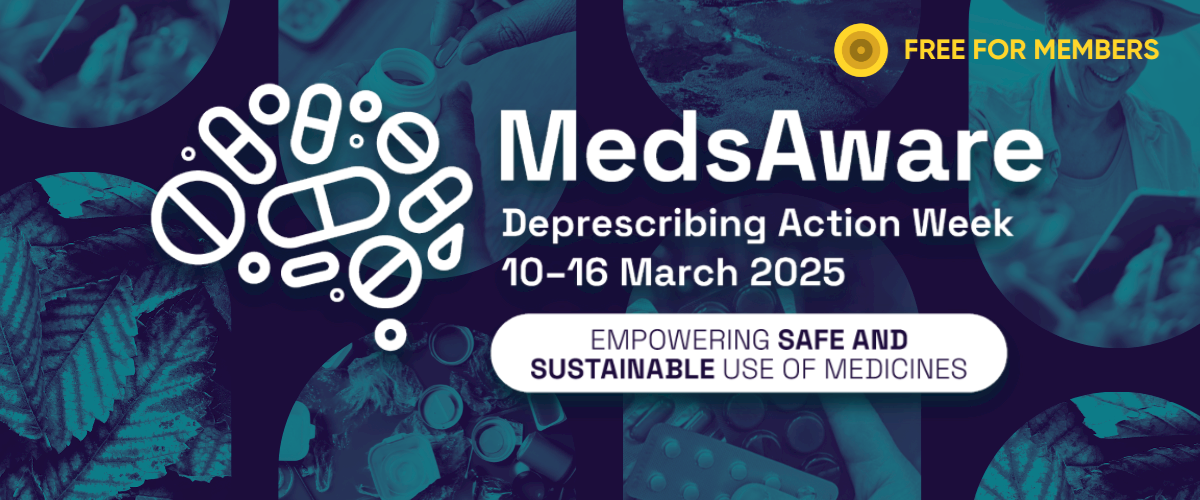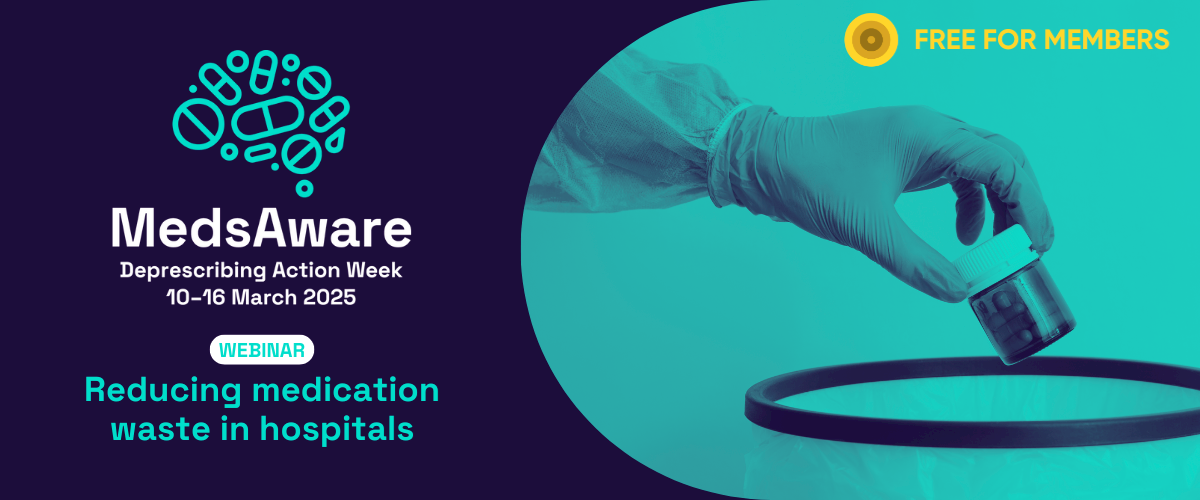MedsAware 2025 campaign resources
MedsAware 2025 continues to raise awareness around deprescribing, seeking to empower Australians to think safely and sustainably about medicine use.

Medicines can have important benefits in curing and preventing diseases and improving symptoms. However, the potential benefits and harms of medicines can change over time as a person ages, acquires new medical conditions, takes new medicines and changes their care goals. Therefore, medicines should be regularly reviewed to make sure that they are still of benefit, and not causing any harms.
Medicines can also impact the world around us.
Globally health systems account for 4.4% of all greenhouse gas emissions and sadly for us in Australia this number sits even higher at 7%. Hospitals and medicines alone account for two thirds of the carbon footprint associated with health care in Australia.[1]

Reference: Kouladjian O’Donnell L, 2024
Building ‘planetary consciousness’ in healthcare practice, policy, research, and education is critical; we cannot ignore the fact that climate change is the biggest health threat of this century. Reducing the impact of medicines on the natural environment is a fundamental principle of Australia’s National Medicines Policy.
[1] ‘The carbon footprint of Australian health care’, Malik, Arunima et al. The Lancet Planetary Health, Volume 2, Issue 1, e27 - e35
‘Deprescribing’ describes the process of stopping medicines that are no longer required, or for which the risk of harm outweighs the benefits in the individual.*
Deprescribing also affords us the opportunity to not only improve medicines safety and patient care directly, but to contribute to a more sustainable and healthier planet.
Australians should be empowered to think safely and sustainably about their medicines.
By taking small steps, beginning with a simple conversation with your doctor or pharmacist, we can all help reduce the environmental impact of medicines.
*Medicines should never be stopped without talking to a doctor or pharmacist.

Polypharmacy refers to the use of multiple medicines, usually defined as the use of five or more regular medicines.
Australian research indicates nine in 10 Australians in aged care take at least five regular medicines every day, and 65% take more than 10 ('hyperpolypharmacy').
Polypharmacy and hyperpolypharmacy are associated with increased risk of side effects and other medicine related harms like falls and hospitalisation
250,000 Australians are admitted to hospital each year due to medication-related issues, many of which are preventable; we need to break this cycle.1
Deprescribing describes the process of discontinuing medicines that are no longer required, or for which the risk of harm outweighs the benefits.
Think of deprescribing as spring cleaning for your medicine cabinet. Just like how you tidy up your house and get rid of objects that are causing clutter without being useful, deprescribing tidies up your medication list to keep only the ones that are truly required.
Deprescribing is safe when planned and supervised by a healthcare professional.
Deprescribing minimises the risk of withdrawal effects through careful monitoring and gradual tapering of medicines.
Deprescribing empowers the care team and the patient through safer, shared decision-making.
|
|
 |
Some questions to ask about your medicinesWhat medications do I need to keep taking, and why? Have any medications been added, stopped or changed, and why? How will I know if my medication is working and what side effects do I watch for? How will this medicine help me? How do I take this medicine and for how long? What are the risks of taking this medicine? What else can I do? I don’t like taking this medicine. I’m worried it’s giving me side effects, or I don’t think it is working. Could you please review it? I’m not sure why I take this medicine. Could we talk about this? I would like you to please review if I still need this medicine. Could I possibly stop taking this medicine? |
Sources:
https://www.choosingwisely.org.au/assets/NPSMW2464_GMBH_5-QuestionsAboutYourMedicines.pdf
https://www.ismp-canada.org/download/MedRec/5questions/MedSafetyPoster-CaDeN-EN.pdf
https://onlinelibrary.wiley.com/doi/10.1111/bcpt.13938
Check out the free webinars hosted during MedsAware 2025:

This webinar will examine the link between deprescribing and the environmental impact of medicines, highlighting the benefits of deprescribing – for people and the planet.

Medication waste in hospitals and healthcare systems is a significant source of environmental and financial waste. This webinar will overview the impact of medication use on the environment and provide practical insights into multidisciplinary approaches that can reduce medication waste.

"I am proud to be supporting the MedsAware 2025 Deprescribing Action Week.
Deprescribing is a “win win” action – reduction in medication misadventure risk and financial cost for patients, and reduction in environmental impact of the manufacture, use and disposal of medicines. I am delighted that the MedsAware 2025 campaign are bringing the benefits of deprescribing for people and the planet to the forefront for consumers and healthcare professionals.
This type of campaign has the potential to drive simple conversations and create change, one small step at a time. I encourage everyone to take part in this year’s MedsAware to be empowered to use medicines safely and sustainably."
Grace Wong FAdPha
MedsAware 2025 Campaign Ambassador
Founding Member of AdPha’s Climate and Health Specialty Practice Group, Founder of Pharmacists for the Environment Australia
— Advanced Pharmacy Australia (AdPha) President, Tom Simpson |
|
— Emily Reeve, ADeN Chair |
|
— Paul Sinclair AM, FIP president |
|
— Distinguished Laureate Professor Nicholas J. Talley AC |
|
— Dr Michael Wright, RACGP President |
|
— Nenad Miljkovic, EAHP President |
|
— Sebastian Harper, NAPSA National President |
|
— Hayley Blackburn, Co-Founder, Rx for Climate |
|
— Anita Shutt, Chair of CATAG |
|
— Distinguished Laureate Professor Nicholas J. Talley AC, Board Chair Doctors for the Environment Australia |
|
— Natalie Sullivan, CEO, EACH |
|
— Kim Brotherson, Managing Director Pharmacy 777 |
Are you interested in becoming a MedsAware 2025 supporter? Submit your expression of interest today!

Founding partner: Australian Deprescribing Network (ADeN)
The Australian Deprescribing Network (ADeN) involves clinicians, academic researchers, policy makers, students and consumers working together to develop the evidence-base, clinical guidance and knowledge translation to facilitate deprescribing of medicines that are no longer providing benefit or are causing harm. ADeN aims to promote research, awareness, practice and policy for the safe and appropriate use of medicines for all Australians.
ADeN are a joint founding partner of MedsAware: Deprescribing Action Week.
Visit their website to:
Follow ADeN on X: @DeprescribeAU
 |
 |
 |
 |
 |
|
 |
 |
 |
|
Official Media Partner |
 |
 |
 |
 |
 |
 |
 |
Australian Deprescribing Network (ADeN) The Australian Deprescribing Network (ADeN) involves clinicians, academic researchers, policy makers, students and consumers working together to develop the evidence-base, clinical guidance and knowledge translation to facilitate deprescribing of medicines that are no longer providing benefit or are causing harm. ADeN aims to promote research, awareness, practice and policy for the safe and appropriate use of medicines for all Australians. Visit their website to:
Follow ADeN on X: @DeprescribeAU |
 |
Council of Australian Therapeutic Advisory Groups (CATAG) CATAG is a collaborative incorporating all Australian State and Territory Therapeutic or Medicines Advisory Groups. CATAG is an expert and consensus-based collaboration that influences clinical governance so that a quality use of medicines approach is considered in both policy and practice. CATAG is dedicated to optimising medicines use and promoting the safe, effective, equitable and sustainable use of medicines. CATAG facilitates information and knowledge exchange, provides guidance, and advocates for best practices in therapeutic decision-making. |
 |
The European Association of Hospital Pharmacists (EAHP) The European Association of Hospital Pharmacists (EAHP) is an association of national organisations representing hospital pharmacists at European and international levels. EAHP represents over 29,000 hospital pharmacists across 36 member countries. EAHP represents and develops the hospital pharmacy profession within Europe in order to ensure the continuous improvement of care and outcomes for patients in the hospital setting. This is achieved through science, research, education, practice, as well as sharing best-practice and responsibility with other healthcare professionals. |
 |
The International Pharmaceutical Federation (FIP) The International Pharmaceutical Federation (FIP) is the global body for pharmacy, pharmaceutical sciences and pharmaceutical education. Through 158 national organisations, allied organisations (including academic institutional members) and individual members, FIP represents over four million pharmacists, pharmaceutical scientists and pharmaceutical educators around the world. |
 |
National Australian Pharmacy Students’ Association (NAPSA) The National Australian Pharmacy Students’ Association (NAPSA) is the peak representative body for pharmacy students in Australia. We are a not-for-profit organisation that represents the interests of all pharmacy students in the 19 pharmacy schools located around Australia, providing a range of services and supporting our members and local branches. NAPSA works to promote the pharmacy profession to the public through our involvement in policy development and advocacy, helping to shape the future of the profession. We are committed to promoting and providing professional development opportunities for our members, including networking, leadership and advocacy training, and opportunities to participate in national and international events. |
 |
Royal Australian College of General Practitioners (RACGP) The Royal Australian College of General Practitioners (RACGP) is the peak representative organisation for general practice, the backbone of Australia’s health system. We set the standards for general practice, facilitate lifelong learning for GPs, connect the general practice community, and advocate for better health and wellbeing for all Australians. |
 |
Registry of Senior Australians (ROSA) The Registry of Senior Australians (ROSA) is a national multisectoral integrated data platform designed to monitor and evaluate the health, service use, social welfare, medication use, mortality, and other outcomes of >3.5 million people who received or are receiving aged care services nationally. |
 |
Rx for Climate Rx for Climate is a global network designed to support environmentally sustainable pharmacy practice and to promote pharmacists' role in mitigating the impacts of climate change on human health. This forum enables pharmacy professionals, students, and educators to access high-quality evidence and practice-relevant resources, and encourages collaboration and sharing of ideas. Our goal is to empower pharmacy practitioners to minimize the environmental impacts of healthcare while optimizing patient outcomes. |
 |
Pharmacists for the Environment Australia (PEA) Pharmacists for the Environment Australia (PEA) is committed to advocacy & promotion of sustainable pharmacy practices for better human and planet health. |
 |
EACH EACH is a for-purpose organisation delivering health and support services that improve lives and strengthen communities. Originally established as Maroondah Social Health Centre in 1974, the organisation was founded on the principle that all people are entitled to good health regardless of socio-economic factors. EACH has evolved over the last 50 years to become a responsive, community-based organisation with approximately 1500 employees and 200 volunteers providing services to 65,000+ customers from 58 locations along the eastern seaboard of Australia (within the metropolitan and regional areas of Victoria, New South Wales, Australian Capital Territory and Queensland). |
 |
The Pharmacy Guild of Australia The Pharmacy Guild of Australia is a national employers’ organisation registered under the federal Fair Work Act 2009, with almost 100 years of experience in representing and promoting the value of community pharmacy in the Australian health care system. Community pharmacies are a vital part of our national health system with the potential to make an even bigger contribution to the health of all Australians. |
 |
Pharmacy 777 At Pharmacy 777 we're here to serve the healthcare needs of our community. With over 85 locations nationwide, and growing, our 777 Pharmacists offer a range of health services, as well as ongoing support and personalised advice to patients (in collaboration with the wider healthcare network) through each stage of life. You’re at the heart of everything we do. |
MedsAware 2025 continues to raise awareness around deprescribing, seeking to empower Australians to think safely and sustainably about medicine use.
MedsAware 'Ask because you care' empowers older Australians, Australian living with a disability and their care teams to ask health professionals ‘Could any of these medicines be doing more harm than good?’
In our inaugural year, MedsAware raises awareness around polypharmacy and deprescribing encouraging Australians to check their medicines are current, effective and safe.